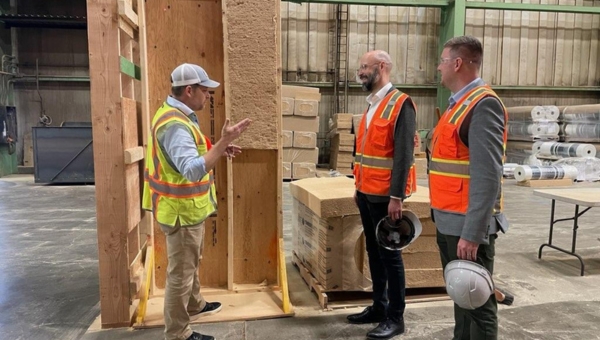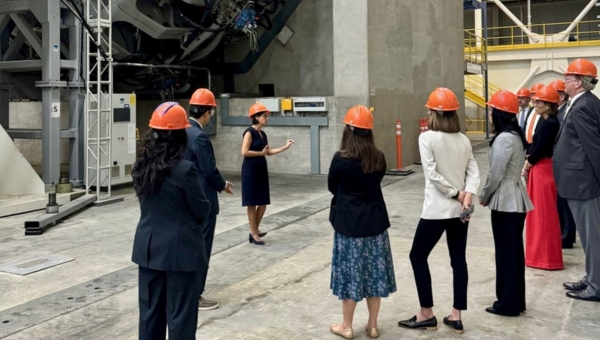Two Heinz alumni are working to spur regional economic development through Tech Hubs Program
By Emma Folts
Growing up in Pittsburgh, Jacob Wildfire (MSPPM '22) saw the city’s economic revitalization after the collapse of the steel industry. The experience stayed with him. “I've always loved seeing the process of economic and community transformation,” he said.
Grace Klein (MSPPM '20) grew up witnessing the transformation of New York City’s footprint under former Mayor Michael Bloomberg. She initially pursued a career in urban planning but pivoted to economic development after recognizing that some U.S. cities weren’t accessing the benefits of the growing tech economy.
Their interests led them to the Heinz College of Information Systems and Public Policy, where both pursued master’s degrees in public policy and management. Now, they work together at the U.S. Economic Development Administration (EDA), helping regions across the country become leaders in emerging industries through the federal Tech Hubs Program.
“It feels really special” to collaborate with Klein, Wildfire said. “I can rely on her because I know how hard she worked at Heinz; I know what type of quality product she puts forward.”
Driving regional economic growth
The Tech Hubs Program aims to create jobs and grow the U.S. economy by investing in regions that could become global powerhouses in tech and other emerging industries, according to the EDA. In each hub, a consortium of public, private and academic institutions uses program funding to advance proposed projects.
The federal government authorized $10 billion for the program through the CHIPS and Science Act of 2022; Congress has appropriated at least $500 million to the EDA so far.
“We need to give people the opportunity to build their careers and fulfill their goals within their home regions,” Klein said. “They shouldn't have to move across the country just to work in advanced tech, or be paid a living wage, or feel connected to the global economy.”
Former President Joe Biden announced the 31 inaugural Tech Hubs in October 2023, with the EDA announcing in July 2024 that 12 hubs will receive additional implementation grants. The hubs span 32 states and Puerto Rico, and their proposed projects are related to semiconductors, clean energy, advanced manufacturing and more.
While Pittsburgh is not a Tech Hub, the Southwestern Pennsylvania region was awarded about $63 million under EDA’s Build Back Better Regional Challenge program, after which the Tech Hubs program is modeled.
Wildfire and Klein provided technical assistance to the hubs on budgets and scopes of work as they applied for the implementation grants. They’ve also connected the hubs to other federal agencies to access additional opportunities. They’ve sought to ensure the proposed projects benefit the host regions and their historically underrepresented communities.
From July through November, Klein, Wildfire and other EDA employees performed site visits. The visits have made clear the impact of the Tech Hubs Program. At a photonics facility in Rochester, New York, for example, Wildfire said “You're seeing machines that cost a million dollars, and their new workforce development program is letting 19-year-olds learn how to use them.”
“We're talking about this really incredible opportunity for students who may not have had that type of job potential to now have it in their backyard,” he continued.

Working directly with communities
Wildfire (far right) conducting a site visit.
Representatives from some of the Tech Hubs said Klein and Wildfire have helped their teams navigate complicated federal grants and learn to collaborate with public and private partners.
The Elevate Quantum Tech Hub, which serves Colorado and New Mexico and aims to strengthen the region’s quantum information technology sector, works with Klein. Zachary Yerushalmi, chief executive and co-founder of Elevate Quantum, believes that a leading presence in the sector could bring significant economic benefits to the region and country.
“We saw the impact of a region being able to drive forward a technology package: It's called Silicon Valley,” Yerushalmi said. “That same opportunity is present for quantum computing, and the region that can play the outsized and leading role, by every measure, is the Mountain West, including Colorado, New Mexico, and Wyoming.”
Wildfire oversees, among others, the Illinois Fermentation and Agriculture Biomanufacturing (iFAB) Tech Hub. Led by the University of Illinois Urbana-Champaign, the hub aims to help biomanufacturing companies turn corn and soybean feedstocks into food ingredients, materials and chemicals at a large scale. The process is known as precision fermentation, and the related industry is projected to be worth $200 billion by 2040.
Beth Conerty, the regional innovation officer for iFAB, said the hub could have a substantial economic impact on the state’s rural communities and allow the university to formalize relationships with local food ingredient manufacturers. She views the Tech Hubs Program as “external validation for what we are capable of.”
“We can shout from the rooftops all day, ‘Look at us. We are really good at biomanufacturing. No, no, I promise you, we are really good at biomanufacturing.’ But in reality, Champaign, Urbana and Decatur, Illinois, are not large, major metropolitan areas,” she said. “It's a challenging thing to prove.”
Conerty added that the EDA “vetted us, they combed through our application, they checked what we were claiming, and by receiving a Tech Hub designation, it is the federal government’s stamp of approval. It starts conversations that, in other contexts, would take much longer to have.”
Representatives from the Tech Hubs have seen firsthand how Klein and Wildfire’s guidance has helped spur economic growth in their regions. Their ability to affect large-scale change traces back to the foundation Klein and Wildfire built at Heinz College.
The impact of Heinz College
Klein chose Heinz College because she liked that the courses were oriented around solving problems. She frequently draws on the management science framework she learned at the college to guide her decisions at the EDA, where she said the team often has to balance the department’s priorities with its finite resources.“And then, being at CMU in Pittsburgh, it's such a key player to the economic development landscape,” she said. “If you have CMU in your email handle, you're going to get the email responded to. That was hugely helpful for me securing internships, and those internships very much led to this position.”

Powering regional economic growth
Klein, in white, visiting Clemson University's Dominion Energy Innovation Center, a grantee and part of the South Carolina Hub.
In choosing Heinz College, Wildfire said he was forcing himself to “go into a program that would kick my butt.” He wanted to improve his skills in data analytics and become more comfortable using statistics and spreadsheets. He gained those foundational data skills while also learning concepts in industrial policy that support his work today.
At Heinz, Wildfire worked under Rick Stafford, a recently retired distinguished service professor of public policy, to pursue an independent research project on the economic future of rural communities in Western Pennsylvania. He met residents of the region’s small towns –– hearing their frustrations with lacking government investment –– and officials in state government. His work for the EDA is like a scaled-up version of that project, Wildfire said.
“I was able to access the world's best experts in economics, in data analysis, and take those learnings directly to my job, even in the smallest things, from developing a presentation and being able to speak cogently to a boss or a supervisor to, more specifically, thinking about economic development theory and best practices in government intervention,” he said.
What’s next for the regional development projects?
Many of the Tech Hubs are moving into the implementation stage, hiring teams and pursuing their subcontracts. While the EDA is hopeful that the Tech Hubs Program will generate early results, Klein noted that economic development doesn’t happen overnight and transformational successes from the program will likely happen in several years.
“The win so far has really been the new relationships that they've developed,” Klein said. “We've heard from a lot of them that there's increased business expansion or relocation interest in their regions just since being designated, and that includes from domestic companies as well as international ones looking to develop a U.S. footprint.”
iFAB, in Illinois, is in conversation with more than a dozen companies that are considering the region for their next manufacturing site, Conerty said. She added that the hub is soliciting architecture and engineering services and will likely be working on construction projects for the next few years.
The Elevate Quantum Tech Hub has broken ground on a seventy-plus-acre campus near Denver, Boulder, and Golden, Colorado, Yerushalmi said.
The Tech Hubs Program is asking participants to brainstorm and put forth a vision for the future. Wildfire said. “It’s all about hope and opportunity and sharing this incredible technological access and innovation that we have to all the reaches of our country. And that feels good.”